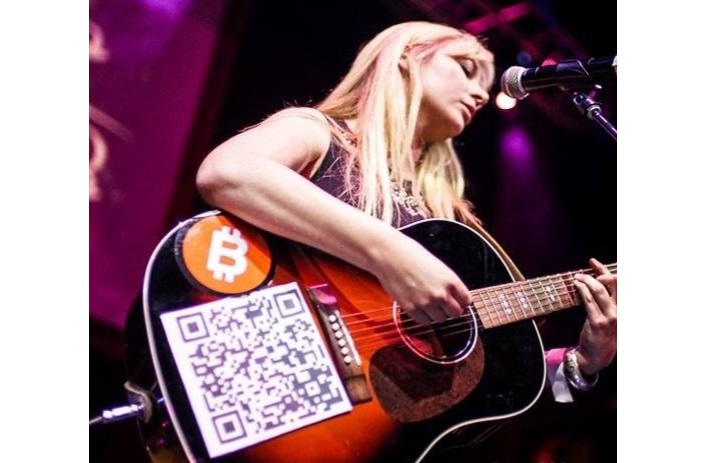Coming off a powerful speech and singing performance to close out the Bitcoin South Conference in gorgeous Queenstown, New Zealand, Tatiana Moroz is solidifying her stature as a sought after presence at Cryptocurrency and Liberty events.
She is one of the rare examples of what a person can do if they just believe in changing the system for the better. And without a background in Programming, Finance or Law, she has done as much to promote Bitcoin as anyone that was not an early adopter.
While everyone is out there trying to create the killer app or looking for a way to dodge the regulatory hammer, she is the friendly face that will spend whatever time requires for new comers to understand the importance of the Blockchain.
Tatiana is the reason why at least one recording studio in the heart of New York City now accepts Bitcoin, and she’s just getting started.

Cointelegraph caught up with the talented Tatiana Moroz for a few exclusive questions.
Cointelegraph: You have now been traveling using Bitcoin through Australia and New Zealand for about a month, what has the journey been like?
Tatiana Moroz: I will try to keep this short, but that may be tricky with all the action! At the community co-working space called the “Melbourne Bitcoin Technology Center,” I did a launch event, talk, and celebration there with Andreas Antonopoulos. Later that evening, we had a Coinjar, Bitcoin Association of Australia, and the College Crypto Network sponsored talk/party with Andreas and Pamela Morgan. Pam and I had never shared a stage together, it was really impromptu, but it worked so well that we did the same in Sydney at Atlassian.
Plus, speaking is still relatively new for me, but I think we were all really engaging, informative, and covered a variety of topics with 200-300 people per event. I went for a girl’s night out with Zhoe from Coinjar and we used their swipe credit card. So easy! I really wish we had that in the states! Other times using Bitcoin wasn’t as easy, but we did have Airbitz to help locate Bitcoin businesses and Cheap Air for some flights.
When in Bitcoin South, we all went up in the 1st helicopter ride in NZ paid for in Bitcoin. It was wonderful meeting all the people, especially when Fran from Brave New Coin opened his home to the speakers and some guests for a beautiful dinner. We got a lot of video footage for my traveling with music and Bitcoin lifestyle based series, so I am eager to get to editing. It’s tough on a tight budget, but that’s why we have awesome sponsors and donations, so we can keep creating content geared for larger audiences.
There are so many innovative businesses here, and the community is thriving, though I don’t think enough VCs have seen the potential of this market yet. There are senate hearings going on right now. There’s a thriving tech industry here, and with all the solar power, so much opportunity. We will see what happens, but I know the speakers were really impressed with Australia and New Zealand and will be back next year!
CT: How did you first hear about Bitcoin and what made you decide to get involved?
TM: I first heard about Bitcoin back in August of 2012, when BitPay sponsored me at a Ron Paul event down in Tampa for the Republican National Convention. As you know, Tony is a brilliant communicator, but despite his best efforts, I didn’t really understand why I should care about some weird internet money. I had been singing anti-war and freedom themed music for all of 2012, so I suppose that’s why he felt I would be a good target for his Bitcoin evangelizing.
“This technology was created without asking for permission, and it encompassed all of mankind’s brilliant unstoppable spirit.”
On my end, I always felt that music had a critical role in shaping the world around us, and wanted my music to make a difference. I was very discouraged with the political route, especially after seeing all the cheating and corruption in the US voting system during the election season. I kept on trying to get the message out, but the crowds of people you saw during 2012 weren’t showing up anymore.
We were defeated in some ways. However, when I attended Jeffrey Tucker’s crypto currency convention in Atlanta (I was performing at BitPay’s party), I recognized hope once again. I loved the rebellious innovative nature of it, and the refusal of humanity to eternally submit to the banking cartels, endless war, and oppression. This technology was created without asking for permission, and it encompassed all of mankind’s brilliant unstoppable spirit. How could I resist, once I saw the possibilities?

CT: How does it feel to be one of the non-technical voices in this space?
TM: Sometimes it can be intimidating, but on the other hand, I think it can be an advantage. You need different perspectives in the community. I have an original voice by not only being a woman, but also a musician. So I feel that I am unique and can offer something fresh. We need that diversity, and it also allows me to reach people within the community and beyond. It’s very rewarding.
“I would like to meet Ross [Ulbricht] as a free man.”
CT: Which personalities in this space have you not yet met but want to?
TM: I would really like to spend a bit more time talking anti-war with Roger Ver. He is always so outspoken in that regard, which I admire and of course agree with. Plus, he is a big supporter of Ross Ulbricht. Actually, THAT’S the person I would want to meet the most. I would like to meet Ross as a free man. I have been lucky enough to get to know his mother and sister, and they are such wonderful people. Truly kind, courageous, and strong. Their story, even with its darkness, has so much to teach us. They are an inspiration.
On my 3rd album (out in Spring 2015), I have a song called “The Silk Road.” It isn’t about Ross per se, as he is only allegedly DPR; it’s about so much more. The war on drugs affects millions of people. It makes criminals out of those who perhaps need some counseling, or maybe we need to look at why specific drugs are illegal as a larger framework for viewing the world’s problems. It is one of the most prevalent reasons for putting people in cages, often for victimless crimes. The governments help create drug cartels with their prohibition, which is what can make the drug trade so violent.
The Silk Road wasn’t ONLY used for illicit drugs, and it actually made drug use safer. I am pretty sure people didn’t stop using drugs when they shut it down. They just went back to the alley deals with dodgy characters and product that can be poor quality and therefore more dangerous. I am really proud of the song, because I put a lot of heart into my message about that controversial topic.
I really hope that my small contribution can get people to think differently, raise awareness, or at least offer some comfort to those affected. I also hope Cointelegraph readers will consider contributing to Ross’s defense fund and spreading the word about his case: freeross.org
CT: Do you think it’s getting a little easier to explain Bitcoin to your friends and family or is it still a major struggle for you?
TM: I think it’s a learning process for all of us. I know I can get intimidated about explaining Bitcoin, because I want people to love it as much as I do! I really want to nail the perfect delivery. When I attend conferences, I like to try and pinpoint how different people explain it, and see if it resonates with me.
“The Bitcoiners need a voice, and luckily, we have a lot of content being created to communicate that message through articles, videos, art, and music.”
However, I think what will make it easier is the news surrounding cryptocurrencies. When people hear about MtGox, they are already predisposed to rejecting Bitcoin, no matter how I phrase it. They think it’s a scam. When they hear about Microsoft accepting it, or how the United Way or Greenpeace are using it to help people, that’s when they are more willing to listen.
This illustrates the importance of having and supporting our own media. The Bitcoiners need a voice, and luckily, we have a lot of content being created to communicate that message through articles, videos, art, and music.
CT: You live in NYC, so I’m sure you are well aware of the Bitlicense proposal, how would that have affected the release of Tatiana Coin?
TM: I think of Tatiana Coin as an experiment, a way to help artists connect and engage with their fans long term while still being able to record and pay rent. We learned a lot with its creation, which was the goal. It wasn’t some huge money making opportunity, although it did allow me to fund at least part of my album and I’m grateful for the community’s continued support.
I have applied some of those lessons with the planned re-launch in January by making it easier to get directly from my website thanks to the guys at Vennd.io. So I don’t worry about Bitlicense. I can’t imagine that an artist’s cryptocurrency would be high on the priority list of regulators, because who doesn’t like music?
On the other hand, they need to keep in mind that by over regulating, they will simply drive the Bitcoin companies elsewhere. We need to keep as many jobs in the US as possible with the current economic crisis. We’re already seeing entrepreneurs being forced to move to other countries where it’s easier to do business. I know there are a lot of revisions underway, so I hope they listen to the people who understand the possibilities in this fantastic new technology.
More information:
- www.TatianaMoroz.com
- www.Twitter.com/QueenTatiana
- www.Facebook.com/TatianaMorozMusic
- https://www.changetip.com/tipme/tatiana
- Bitcoin Address: 1K36BLsYGf2go8x9nmUgrxCJxA47QQSu8u
Did you enjoy this article? You may also be interested in reading these ones:
